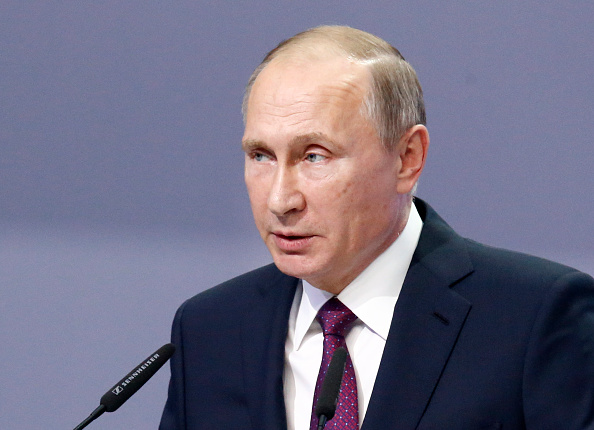Russia to withdraw from the International Criminal Court


A free daily email with the biggest news stories of the day – and the best features from TheWeek.com
You are now subscribed
Your newsletter sign-up was successful
Russian President Vladimir Putin signed a decree to remove Russia from the International Criminal Court on Wednesday after mounting criticism of his airstrikes in Syria and 2014 annexation of Crimea.
The International Criminal Court rules on offenses including genocide and crimes against humanity. Putin's decision to withdraw notably comes on the heels of the U.N. General Assembly's human rights committee approving a resolution that condemns Russia for its occupation of Crimea. French President Francois Hollande also called Russia's bombings in Syria "war crimes" last month, The Independent notes.
Putin had signed the Rome Statute, which established the International Criminal Court, in 2000, although the Kremlin had never ratified the agreement. The U.S., as well as China, India, Pakistan, Indonesia, and Turkey, never signed the treaty.
The Week
Escape your echo chamber. Get the facts behind the news, plus analysis from multiple perspectives.

Sign up for The Week's Free Newsletters
From our morning news briefing to a weekly Good News Newsletter, get the best of The Week delivered directly to your inbox.
From our morning news briefing to a weekly Good News Newsletter, get the best of The Week delivered directly to your inbox.
"The International Criminal Court has not justified hopes placed upon it and did not become a truly independent and authoritative judicial body," a Russian foreign ministry spokesperson said.
Several other countries, including South Africa, have also made moves to withdraw from the criminal court. "If the State Parties, who apparently have been masquerading in recent years as countries devoted to criminal accountability, want to leave, then they should leave," Zeid Ra'ad al-Hussein, the U.N. High Commissioner for Human Rights, said Wednesday. "But we are not convinced their position is based entirely on principle. Quite the opposite: It appears to aim more at protecting their leaders from prosecution."
A free daily email with the biggest news stories of the day – and the best features from TheWeek.com
Jeva Lange was the executive editor at TheWeek.com. She formerly served as The Week's deputy editor and culture critic. She is also a contributor to Screen Slate, and her writing has appeared in The New York Daily News, The Awl, Vice, and Gothamist, among other publications. Jeva lives in New York City. Follow her on Twitter.
-
 The mystery of flight MH370
The mystery of flight MH370The Explainer In 2014, the passenger plane vanished without trace. Twelve years on, a new operation is under way to find the wreckage of the doomed airliner
-
 5 royally funny cartoons about the former prince Andrew’s arrest
5 royally funny cartoons about the former prince Andrew’s arrestCartoons Artists take on falling from grace, kingly manners, and more
-
 The identical twins derailing a French murder trial
The identical twins derailing a French murder trialUnder The Radar Police are unable to tell which suspect’s DNA is on the weapon
-
 Nobody seems surprised Wagner's Prigozhin died under suspicious circumstances
Nobody seems surprised Wagner's Prigozhin died under suspicious circumstancesSpeed Read
-
 Western mountain climbers allegedly left Pakistani porter to die on K2
Western mountain climbers allegedly left Pakistani porter to die on K2Speed Read
-
 'Circular saw blades' divide controversial Rio Grande buoys installed by Texas governor
'Circular saw blades' divide controversial Rio Grande buoys installed by Texas governorSpeed Read
-
 Los Angeles city workers stage 1-day walkout over labor conditions
Los Angeles city workers stage 1-day walkout over labor conditionsSpeed Read
-
 Mega Millions jackpot climbs to an estimated $1.55 billion
Mega Millions jackpot climbs to an estimated $1.55 billionSpeed Read
-
 Bangladesh dealing with worst dengue fever outbreak on record
Bangladesh dealing with worst dengue fever outbreak on recordSpeed Read
-
 Glacial outburst flooding in Juneau destroys homes
Glacial outburst flooding in Juneau destroys homesSpeed Read
-
 Scotland seeking 'monster hunters' to search for fabled Loch Ness creature
Scotland seeking 'monster hunters' to search for fabled Loch Ness creatureSpeed Read
